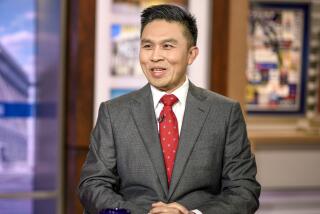Chen Yun; China Official, Rival of Deng
- Share via
BEIJING — Chen Yun, the only serious rival to senior leader Deng Xiaoping and the architect of China’s centrally planned economy, died Monday at age 89.
China’s official media did not report Chen’s death, but Japan’s Kyodo news agency said late Monday that Chen had died, citing unidentified Chinese sources. The report did not say how he died.
A staunch defender of traditional Marxism, Chen ranked behind only 90-year-old Deng among the “eight immortals,” revolutionary leaders who have collectively ruled China. With Chen’s death, only five survive.
Chen, who had been in poor health for years, made his last public appearance during the Chinese New Year holiday in 1994, when he was shown on television greeting leaders.
Chen was the backstage leader of a network of conservative ideologues and bureaucrats, and repeatedly forced Deng to slow or reverse economic reforms that freed much of China’s economy from direct central government control.
Chen supported the concept of reform only as long as it was gradual and limited, and most property and economic decision-making remained in the hands of the state.
Chen summed up his views on the economy by comparing it to a caged bird.
“The bird should be allowed to fly, but only in the cage,” he wrote. “If there is no cage, the bird will escape.”
Chen helped conservative Li Peng rise to the premiership in 1987. After the suppression of the 1989 Tian An Men Square democracy movement, Chen’s followers led the campaign to slow Deng’s market-oriented economic reforms and strengthen central planning.
“The decadent capitalist ideology, which is characterized by the worship of money, is exerting a serious corrosive influence on our party’s work habits and social mores,” Chen told a Communist Party meeting in 1985.
Chen reportedly refused to retire from the party’s top body, the Politburo Standing Committee, as long as Deng sat on the panel. Both men stepped down in 1987.
Chen was born in Shanghai in 1905 as Liao Chengyun. Not much is known of his early years, although he is said to have received little formal education and trained as a typesetter.
After becoming active in a trade union, he joined the newly formed Communist Party in 1925. Nine years later he was elected to the party’s Central Committee and joined revolutionary leader Mao Tse-tung’s forces on the Long March retreat from the Nationalist army.
Chen lived in the Soviet Union from 1935 to 1937, and when he returned to China he went to Mao’s guerrilla headquarters and became head of the party Organization Department.
His economic policies during the fight against Japan in World War II won praise. When the Communists took power in 1949, he was appointed vice premier, chairman of the Committee for Financial and Economic Affairs and minister of heavy industry.
Chen drew up China’s first economic plan, which detailed production quotas for each farm and factory. His leadership was credited with helping to reduce the hunger and deprivation that characterized pre-revolutionary China.
Until 1957, Chen was regarded as the leader of economic policy.
He fell into some disfavor in 1957 when he criticized Mao’s attempt to mobilize the nation in the chaotic “Great Leap Forward,” a rapid push toward decentralized, labor-intensive industrialization.
“One cannot reach heaven in a single leap,” Chen said.
He returned to favor when the Great Leap Forward collapsed into economic chaos and nationwide famine.
More to Read
Sign up for Essential California
The most important California stories and recommendations in your inbox every morning.
You may occasionally receive promotional content from the Los Angeles Times.












